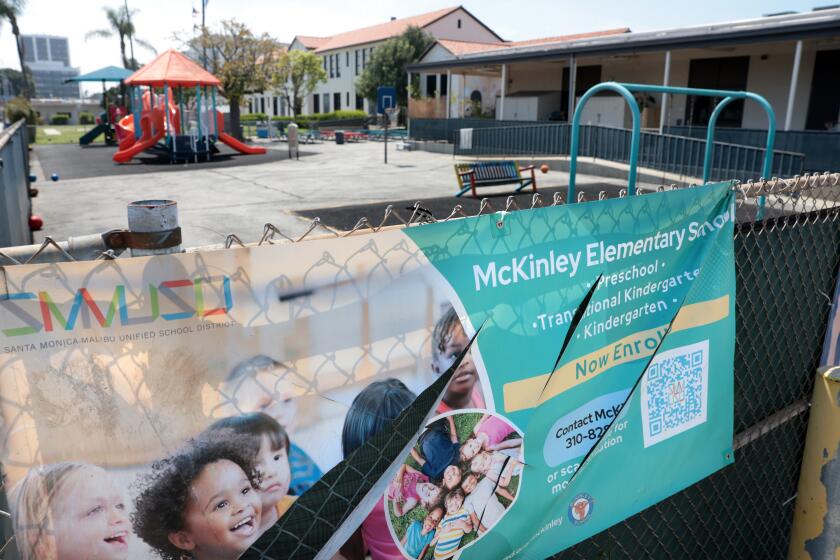California clears hurdle for federal funding
California, which lost out on the first round of controversial federal Race to the Top education grants, emerged as a finalist in its second try, officials announced Tuesday.
“Today’s development means we are still in the hunt,” said state Supt. of Public Instruction Jack O’Connell.
The finalists are the District of Columbia and 18 states, including New York, Florida, Massachusetts, Louisiana, Colorado, Arizona and Hawaii. Winners will share $3.4 billion in funding and will be announced in September.
The Obama administration created the competitive grant program to spur its vision of reform nationwide.
“We really unleashed this huge amount of innovation and courage around the country,” said U.S. Education Secretary Arne Duncan. He predicted that the reform momentum would continue regardless of who wins the federal dollars.
To ensure that more students have effective teachers, the administration has touted evaluating teachers in part by their students’ performance on standardized tests. Many union leaders and rank-and-file teachers oppose that idea.
“Instead of fostering students to become independent thinkers, teachers will have to teach to the tests, which narrows the curriculum and defeats the purpose of public education,” said Charles Olynyk, a history teacher at Roosevelt High in Boyle Heights.
Critics also have argued that some states, including California, became obsessed with winning badly needed funding at the expense of adopting long-term policies that could prove prohibitively expensive and academically detrimental.
Still, the American Federation of Teachers praised the inclusion of states that worked with union leaders on their proposals, while criticizing the selection of the District of Columbia. Michelle Rhee, the chancellor there, has used her new evaluation system to fire hundreds of teachers.
The Washington-based Center for Education Reform, which favors both charter schools and publicly funded vouchers for private schools, criticized Duncan for including too many “status quo” states, which, it said, included Kentucky and Maryland.
If California prevails, the state could receive up to $700 million in one-time funds; a substantial portion would go to the Los Angeles Unified School District.
California’s plan focuses on strategies favored by the Obama administration, including teacher evaluations, placing the most effective educators in struggling schools and improving instruction through the improved use of data.
The state blueprint also embraces the federal emphasis on replacing staff at poorly performing schools and converting some to independently run charter schools, most of which are non-union.
Most of the state’s teachers unions have declined to sign on, which will cost the state some points when evaluators review California’s application.
The office of Republican Gov. Arnold Schwarzenegger, a frequent union foe, said Monday that the lack of union buy-in has been overstated. Teachers union leaders in L.A., for example, “haven’t rejected” the reform package, said Kathryn Gaither, California’s education undersecretary. “They said, ‘We’ll talk.’ ”
Critics of Race to the Top also raised concerns about the ongoing costs of measures begun with one-time funds.
But L.A. schools Supt. Ramon C. Cortines said the dollars would underwrite badly needed efforts, some already underway. He’d like to further develop quality math and science instruction, among other initiatives.
The state amended its first failed proposal by working bottom-up, recruiting a handful of school systems to write a more specific, aggressive plan that other school districts could choose to join. The consortium of seven districts includes those serving L.A., Long Beach, San Francisco, Fresno and Sacramento. Overall 123 school systems approved the framework along with dozens of charter schools.
These districts enroll 1.7 million California students, 68% of whom live in poverty, officials said.
A five-person team, including Cortines, will make California’s pitch on Aug. 9 in Washington.
More to Read
Start your day right
Sign up for Essential California for news, features and recommendations from the L.A. Times and beyond in your inbox six days a week.
You may occasionally receive promotional content from the Los Angeles Times.







